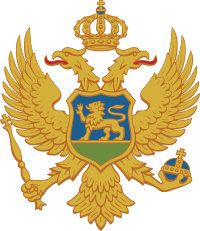Parliament of Montenegro
The Parliament of Montenegro (Montenegrin: Skupština Crne Gore, Скупштина Црне Горе) is the unicameral legislature of Montenegro. The Parliament currently has 81 members, elected for a four-year term. Following the 2006 independence referendum, the Parliament declared and ratified the independence of Montenegro on 3 June 2006. The system of the house is proportional representation. The current Speaker of the Parliament is Ivan Brajović (SD), while Deputy Speakers are Branimir Gvozdenović (DPS) and Genci Nimanbegu (FORCA). Opposition is awarded the remaining Deputy Speaker seat, which is currently vacant due to the ongoing boycott of 39 opposition MPs following the alleged electoral fraud which took place during the latest parliamentary election.
Parliament of Montenegro Skupština Crne Gore Скупштина Црне Горе | |
|---|---|
 | |
| Type | |
| Type | |
| Leadership | |
Vice Presidents | |
| Structure | |
| Seats | 81 |
 | |
Political groups | Government (42) Opposition (39) |
| Elections | |
| Proportional representation under the D'Hondt method | |
Last election | 16 October 2016 |
Next election | 30 August 2020 |
| Meeting place | |
| House of the Assembly Boulevard of Saint Peter of Cetinje, Podgorica | |
| Website | |
| www.skupstina.me | |
History
Parliament of Montenegro has first been established by the Constitution of the Principality of Montenegro in 1905, under the name of Popular Assembly (Narodna skupština), under which it had limited legislative role, limited by the authority of Knjaz (Prince). The first convocation of the Parliament has been constituted in 1906.[1] Following the joining of Kingdom of Montenegro into the Kingdom of Yugoslavia in 1918, the Parliament of Montenegro was disbanded until the World War II. The Parliament was reinstated in 1944, in the form of Montenegrin Antifascist Assembly of National Liberation (CASNO), which changed its name to Montenegrin National Assembly, and later National Assembly, lasting until 1946, when the new Assembly was elected in FR Montenegro, a constituent republic within SFR Yugoslavia. Current convocation is the 23rd since the foundation of the Parliament.
Powers
The Parliament appoints the Prime Minister nominated by the President, as well as the ministers chosen by the Prime Minister. Parliament also passes all laws in Montenegro, ratifies international treaties, appoints justices of all courts, adopts the budget and performs other duties as established by the Constitution.
The Parliament can pass a vote of no-confidence in the Government with a majority of the members.
Deputies
A deputy has a four-year term. One deputy is elected per 6,000 voters, which in turn results in a change of total number of deputies in the parliament.
The present assembly convening comprises 81 deputies instead of previous number of 75.
Elections
The Parliament has 81 members elected by a D'Hondt method system of proportional representation for a four-year term.

The 81 seats of the Parliament of Montenegro are elected in a single nationwide constituency by closed list proportional representation. Seats are allocated using the d'Hondt method with a 3% electoral threshold. However, minority groups that account for at least 15% of the population in a district are given an exemption that lowers the electoral threshold to 0.7% if their list fails to cross the 3% threshold. For ethnic Croats, if no list representing the population passes the 0.7% threshold, the list with the most votes will win one seat if it receives more than 0.35% of the vote.[2]
The most recent elections were held on 16 October 2016 and the next are scheduled for autumn 2020.
2016 election
Parliamentary coalitions and parties
Since October 2016, the ruling majority is formed by DPS, SD, BS, LP, HGI and FORCA.
| Parliamentary groups | Seats | Parties | Seats |
|---|---|---|---|
| Democratic Party of Socialists | 35 | Democratic Party of Socialists (DPS) | 35 |
| Democratic Front (DF) | 17 | ||
| New Serb Democracy (NOVA) | 8 | ||
| Movement for Changes (PzP) | 5 | ||
| Democratic People's Party (DNP) | 4 | ||
| Democratic Montenegro | 8 | Democratic Montenegro (DCG) | 8 |
| For the Benefit of All (DSI) | 7 | ||
| Socialist People's Party (SNP) | 2 | ||
| United Montenegro (UCG) | 2 | ||
| Workers' Party (RP) | 1 | ||
| Nonpartisan | 2 | ||
| Social Democratic Party | 4 | Social Democratic Party (SDP) | 4 |
| Minority parties group | 4 | ||
| Bosniak Party (BS) | 2 | ||
| New Democratic Force (Forca) | 1 | ||
| Croatian Civic Initiative (HGI) | 1 | ||
| SD-LP | 3 | ||
| Social Democrats (SD) | 2 | ||
| Liberal Party (LP) | 1 | ||
| Non-inscrits | 3 | ||
| Democratic Alliance (Demos) | 2 | ||
| United Reform Action (URA) | 1 |
References
- http://www.skupstina.me/index.php/me/skupstina/o-nama/istorijat Archived 2015-09-21 at the Wayback Machine Parliament of Montenegro: History
- Electoral system IPU